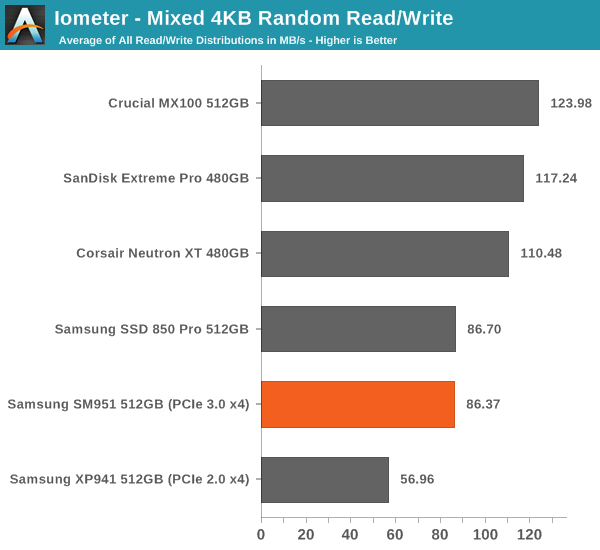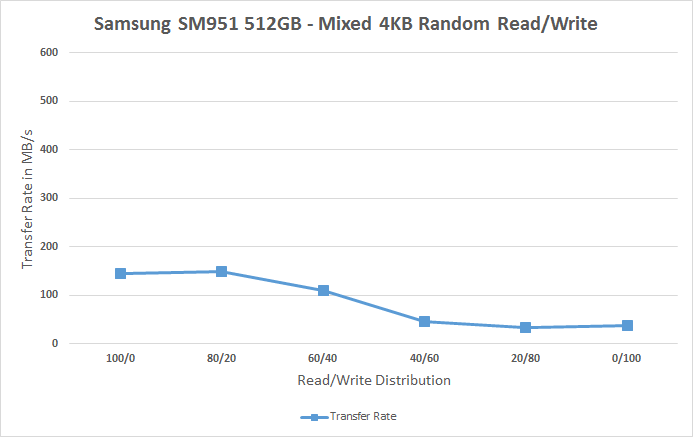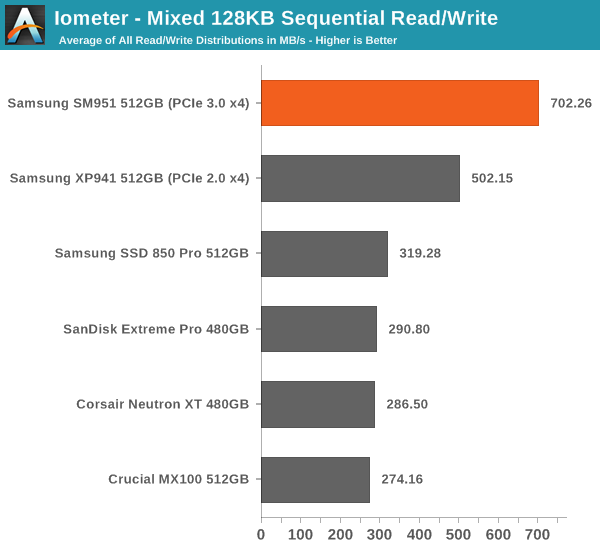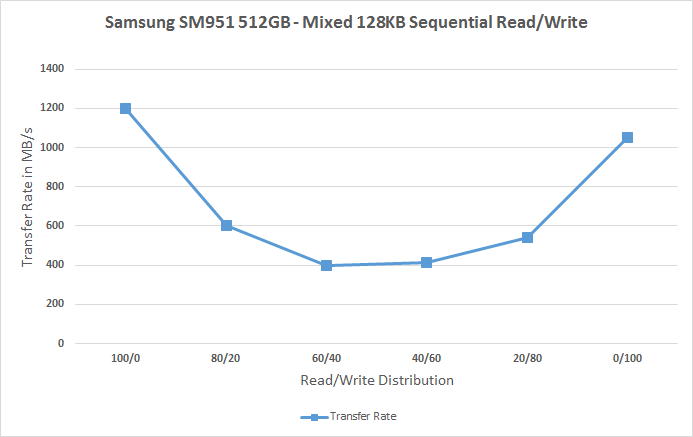Samsung SM951 (512GB) PCIe SSD Review
by Kristian Vättö on February 24, 2015 8:00 AM ESTMixed Random Read/Write Performance
Mixed read/write tests are also a new addition to our test suite. In real world applications a significant portion of workloads are mixed, meaning that there are both read and write IOs. Our Storage Bench benchmarks already illustrate mixed workloads by being based on actual real world IO traces, but until now we haven't had a proper synthetic way to measure mixed performance.
The benchmark is divided into two tests. The first one tests mixed performance with 4KB random IOs at six different read/write distributions starting at 100% reads and adding 20% of writes in each phase. Because we are dealing with a mixed workload that contains reads, the drive is first filled with 128KB sequential data to ensure valid results. Similarly, because the IO pattern is random, I've limited the LBA span to 16GB to ensure that the results aren't affected by IO consistency. The queue depth of the 4KB random test is three.
Again, for the sake of readability, I provide both an average based bar graph as well as a line graph with the full data on it. The bar graph represents an average of all six read/write distribution data rates for quick comparison, whereas the line graph includes a separate data point for each tested distribution.

Quite surprisingly the SM951 and Samsung drives in general don't do very well with mixed data.
 |
|||||||||
The reason lies in the fact that the performance of Samsung drives plummets when the share of writes is increased. At 80/20 read/write, the Samsung drives manage to do pretty well, but after that the performance declines to about 40MB/s. What's odd is that the performance is also bad with 100% writes, whereas with other drives we usually see a spike here. I'm guessing there's some garbage collection going on here that causes the performance degradation.
Mixed Sequential Read/Write Performance
The sequential mixed workload tests are also tested with a full drive, but I've not limited the LBA range as that's not needed with sequential data patterns. The queue depth for the tests is one.

With 128KB sequential data, however, the SM951 is the king of the hill. There's a clear difference between PCIe and SATA based drives, although it's worthy to note that the difference is mostly due to PCIe drives having much higher throughput at 100% reads and writes (i.e. the infamous bathtub curve).
 |
|||||||||










128 Comments
View All Comments
3DoubleD - Tuesday, February 24, 2015 - link
While this drive looks great and all, after all the problems the 840EVO has had, it is hard to get excited about big benchmark numbers from a Samsung drive... you never know if they will stay that way. That said, this drive is MLC and not TLC, so less chance of similar issues as the 840EVO. Still, Samsung has a lot of work to repair their reputation with their customers.theduckofdeath - Tuesday, February 24, 2015 - link
Yeah, they only have a bit more than 1/4 of the market. Really suffering from that snafu... I think you're overreacting just a bit... :)3DoubleD - Tuesday, February 24, 2015 - link
How could their past sales possibly have suffered from a problem that is ongoing and developing? How future customers react will depend on whether Samsung properly addresses the current issues. My comment is based on this fact.theduckofdeath - Tuesday, February 24, 2015 - link
I have an Evo 840 and since the performance restoration fix I have not seen any sign of performance degradation on my drive. And that fix was made in October last year.theduckofdeath - Tuesday, February 24, 2015 - link
And just to clarify hwo desperate your trolling attempts are. It took (a limited number of) users a year to realise there even could be issues. That's how rare and hard to notice it was, even though the Evo 840 is probably the most sold SSD ever.K_Space - Tuesday, February 24, 2015 - link
I am not sure if you are aware, however Samsung has released a recent statement to the effect that there remain issues with the 840 EVO drive and the above fix has not provided a permenant resolution:http://www.anandtech.com/show/8997/samsung-release...
I have an XP941 and SD Extreme Pro 480; it'd sensible to see how Samsung deals with the current situation at hand which may tip me and other enthusiasts (? <5% of their SSD sales) one way or the other.
extide - Tuesday, February 24, 2015 - link
Not really, Samsung has many other great drives, even older ones that are/were still great like the 830, 840 pro, etc. Couple teething issues on early TLC drives, thats pretty much what to expect ion this industry. The MAIN thing is that they are infact handling it, and not just shuffling it under the rug. IMHO thats far more important than anything else.smilingcrow - Wednesday, February 25, 2015 - link
"The MAIN thing is that they are in fact handling it"The MAIN thing for me is when they have HANDLED it and the solution sticks over time as only then would I trust one of their TLC drives again.
If that fails I expect a product recall which they haven't offered on the vanilla 840 yet which seemingly still has no fix. No recall = NOT handling it.
3DoubleD - Wednesday, February 25, 2015 - link
Teething issues - OK, that's fine, as long as they fix them, and that's all I've been saying; however, the verdict is still out as to whether they have fixed them or not, and that was my initial point.The minute they apply a permanent firmware fix or, if a firmware fix is not possible, a recall, then they will have handled it and I'd feel future Samsung purchases were justified. This obviously applies most strongly for Samsung TLC products, but how Samsung responds to SSD issues in general should be of interest of any current and potential Samsung SSD owner (TLC or MLC).
cm2187 - Tuesday, February 24, 2015 - link
What problems are you referring to?